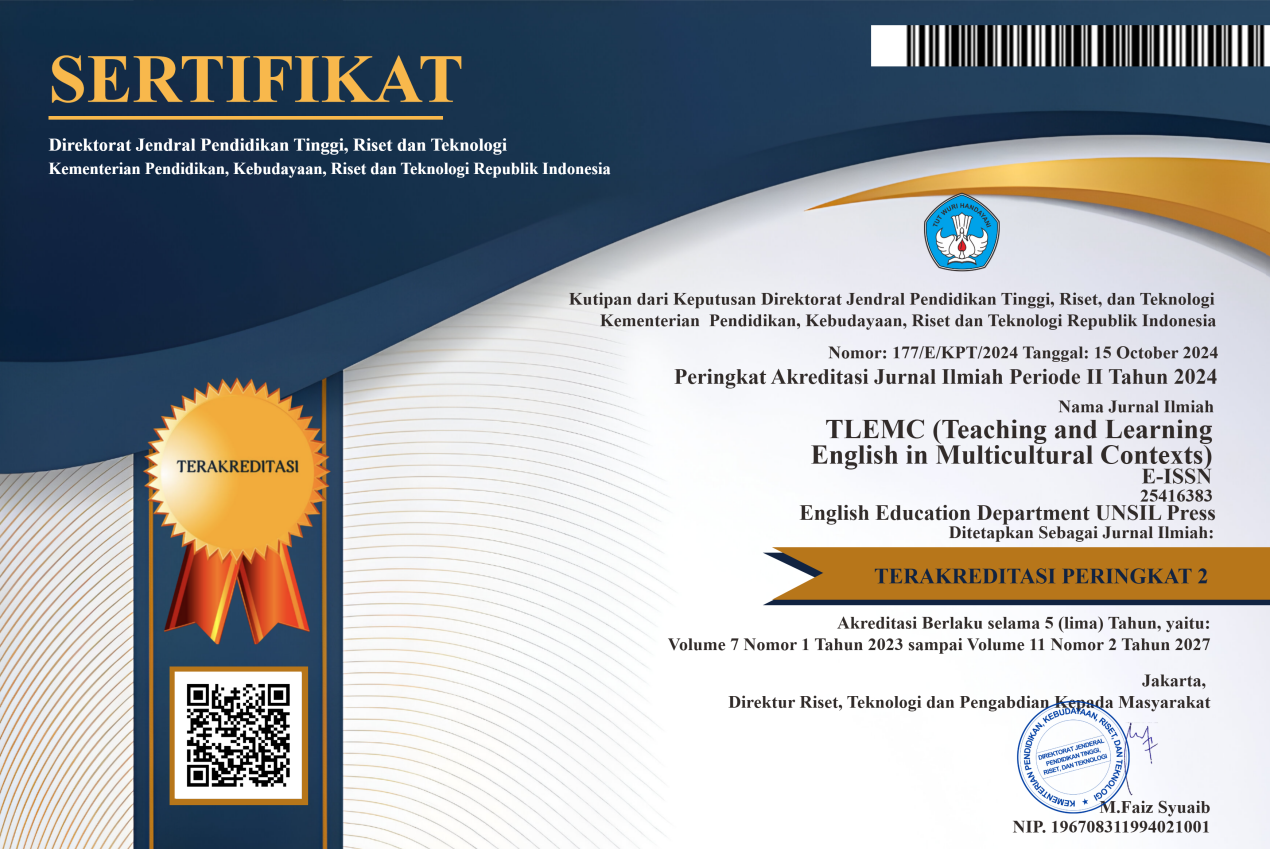Investigating Self-Assessment as a Platform of Student-Teacher’s Reflection in EFL Teaching Practice
Abstract
This reflective practice study aims to investigate how self-assessment as a platform for self-reflection functions to promote student teacher’s professional development. This study involves the researcher herself as a student teacher who completed a teaching practice in a senior high school in Indonesia. To collect the necessary data, this study uses self-assessment, which consists of nine points of self-reflection, including (1) Organization, rules, and procedures; (2) Preparing students for new learning; (3) Positive relationship; (4) Deeping Learning; (5) Presenting new learning; (6) Helping students reflect on and celebrate learning; (7) Culture of thinking and learning; (8) Applying learning; (9) Engagement and Enjoyment. Then, the collected data are analyzed by using thematic analysis. The results showed that there are two main functions of self-assessment in a student teacher’s professional development, which are (1) to improve classroom management skill, and (2) to improve teaching strategy. To sum up, reflection by using self-assessment, which consists of nine assessed points related to the student teacher’s classroom teaching practices, can facilitate reflection on many things related to the teaching and learning process, which in turn can help the student teacher to improve her professional development.
Full Text:
PDFReferences
Abongdia, J. A., Adu, E. O., & Foncha, J. W. (2015). Pre-service teachers’ challenges during teaching practice in one university in the Eastern Cape, South Africa. International Journal of Educational Sciences, 11(1), 50-56.
Allen, Jr., & Chaerles, E., (2017). Teacher self-Assessment: A facilitative process for principal instructional support. Doctoral Dissertation Committeee.Faculty of the College of Education, University of Houston.
Bailey, G. D. (1981). Teacher self-assessment: A means for improving classroom instruction. National Education Association. 8-12
Bakan, U., & Bakan, U. (2018). Game-based learning studies in education journals: A systematic review of recent trends. Actualidades Pedagógicas, 72(72), 119-145.
Billingsley, G. M., McKenzie, J. M., & Scheuermann, B. K. (2020). The effects of a structured classroom management system in secondary resource classrooms. Exceptionality, 28(5), 317-332.
Braun, V., & Clarke, V. (2006). Using thematic analysis in psychology Qualitative research in psychology, 3(2), 77-101.
Brookfield, S. (1995). Becoming a critically reflective teacher. Jossey-Bass.
Cheung, R. H. P. (2009). The use of self-assessment to foster students’ learning in teacher education: An experience in teaching practice. Action in Teacher Education, 31(1), 49–57. doi:10.1080/01626620.2009.10463510
Farrell, T. S. (2008). Reflective practice in the professional development of teachers of adult English language learners. Center for adult English language acquisition. CAELA Network Brief.
Farrell, T. S. C. (2013). Reflective practice in ESL teacher development groups: From practices to principles. Palgrave Macmillan.
Freiberg, H.J., & Snead, L. O.,(2017). Rethinking student teacher feedback: Using a self-Assessment resource with student teachers. SAGE.From practices to principles. UK: Palgrave Macmillan.
Hoover, N. L., & Carroll, R. G. (1987). Self-assessment of classroom instruction: An effective approach to in-service education. Teaching and Teacher Education, 3(3), 179-191. doi:10.1016/0742-051X(87)90002-3
Jasper, M. (2003). Beginning reflective practice. Nelson Thornes.
Kolb, D.A. (1984). Experiential learning: experience as the source of learning & development. Prentice-Hall.
Larrivee, B. (2008). Development of a tool to assess teachers’ level of reflective practice. Reflective practice, 9(3), 341-360. http://dx.doi.org/10.1080/14623940802207451
Loughran, J. J. (2002). Effective reflective practice. Journal of Teacher Education, 53(1), 33–43. doi:10.1177/0022487102053001004
National Council on Teacher Quality (2014). Training our future teachers: Classroom management. Washington, DC. Retrieved from https://www.nctq.org/publications/Training-Our-Future-Teachers:-Classroom-Management
Nilsen, P. N. G., & Ellström, P. E. (2012). Integrating research-based and practice-based knowledge through workplace reflection. Journal of Workplace learning, 24(6), 403-415.
Panandero. E., & Tapia, J. A., (2013). Self-assessment: Theoretical and practical connotations. When it happens, how is it acquired and what to do to develop it in our students. Electronic Journal of Research in Educational Psychology, 11(2), 551-576. DOI: 10.14204/ejrep.30.12200
Plass, J. L., Homer, B. D. & Kinzer, C. K. (2015). Foundations of game-based learning. Educational Psychologist, 50(4), 258-283.
Presadă, D., & Badea, M. (2018). Evaluating Teacher Education Programs for Philology Students. In Teacher Training and Professional Development: Concepts, Methodologies, Tools, and Applications (pp. 1174-1192). IGI Global.
Purcell, D. (2013). Sociology, teaching, and reflective practice: Using writing to improve. Teaching Sociology, 41(1), 5-19.doi: 10.1177/0092055X12460028.
Regawanti, D. T. (2015). Cultivating pre-service teachers’ classroom management skills through teaching practice: a reflective practice. Teflin Journal, 26(1), 117-128.
Richards, J. C., & Farrell, T. S. C. (2005). Professional development for language teachers: Strategies for teacher learning. Cambridge University Press.
Ross, J. A., & Bruce, C. D. (2007). Teacher self-assessment: A mechanism for facilitating professional growth. Teaching and Teacher Education, 23(2), 146–159. doi:10.1016/j.tate.2006.04.035
Sadik, F., (2017). Children and discipline: Investigative secondary school students’ perception of discipline through metaphors. European journal of educational research, 7(1), 31-45.
Sit, H. (2017). Inclusive teaching strategies for discipline-based English studies. Springer.
Virtudazo, M. C. A., & Guhao, E. S. (2020). Student discipline in the classroom: Public school teachers’ point of view. Int. J. Sci. Technol. Res., 9(1), 271-282.
DOI: https://doi.org/10.37058/tlemc.v5i1.3319
Refbacks
- There are currently no refbacks.
INDEXED BY:
This work is licensed under a Creative Commons Attribution-NonCommercial-ShareAlike 4.0 International License.
![]()
TLEMC (Teaching and Learning English in Multicultural Contexts)
Program Studi Pendidikan Bahasa Inggris
Fakultas Keguruan dan Ilmu Pendidikan
Universitas Siliwangi
Jl. Siliwangi No. 24 Kota Tasikmalaya - 46115
email: tlemc@unsil.ac.id





